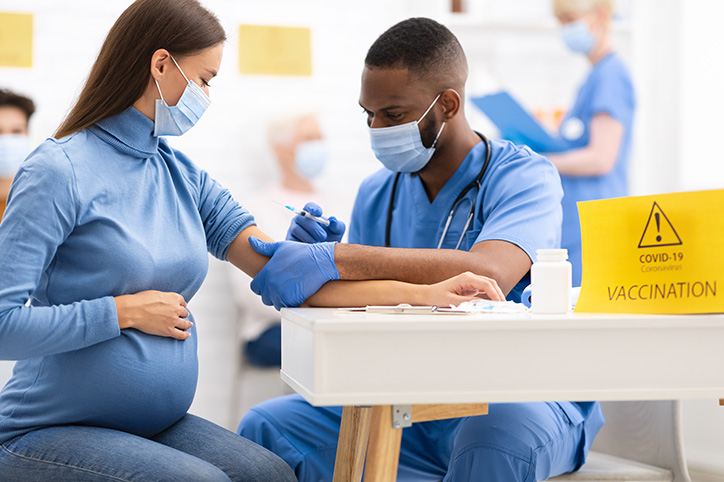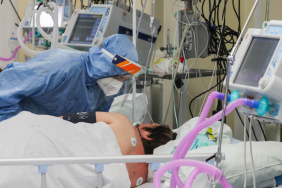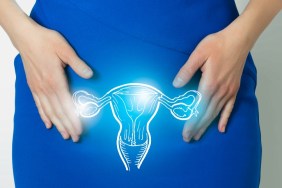Over a year into the pandemic and the million dollar question on many people’s mind remains: what’s the impact of COVID-19 infection and vaccine on fertility? And this is for good reason given that we live in an age where fertility treatments are increasingly common and conditions like autism are rapidly rising (a 20-fold increase since 1980!). The last thing any person needs is an extra hurtle on their quest for a healthy pregnancy and baby.
So first things first: what are the potential dangers for getting COVID-19 when pregnant?
Well, the list isn’t short. Pregnant women are considered by the CDC to be a high-risk group for severe COVID-19 disease. “In pregnancy, as the uterus expands it pushes up against the diaphragm, reducing the capacity of the lungs and making it more difficult to obtain oxygen which must be shared between the pregnant woman and her fetus,” explains Dr. Barry Witt, the chief medical director for WINFertility. “Pregnancy is also known to be a somewhat immune compromised condition, which means that pregnant women are more susceptible to complications from infections.”
Dr. Witt goes on to underline that pregnant women with COVID-19 have been shown to have an increased risk of ICU admission, a greater likelihood of needing mechanical ventilation and ventilator support and even a higher risk for death. Other health conditions (like obesity or other pre-existing conditions) and several racial and socioeconomic factors can further increase the risk of severe COVID-19 disease in pregnant women.
That said, he notes that it’s not yet clear whether COVID-19 infection during pregnancy increases the rate of miscarriage. Fever is a possible symptom of COVID-19 and it’s known that high fever in the first trimester can increase the chance of certain birth defects.
It doesn’t end there.
“COVID-19 infections among pregnant women have been associated with preterm delivery and there have been reports of fetal death and placental infection and injury, which can increase pregnancy complications. Also, COVID-19 can increase the chance of developing clots in some cases of severe infection. ”
Not pregnant yet? There’s good news!
When you’re trying to get pregnant and month after month it’s not happening, it can feel soul crushing, but there’s some good news, at least for women. “There’s no evidence that COVID-19 makes it harder for women to conceive,” says Dr. Witt. “The greater threat to fertility seems more likely among men. Since a number of viruses are known to affect sperm production and male fertility in general, including HIV and the mumps, it would come as no surprise if SARS-CoV2 had an adverse effect. Viruses are known to cause an inflammatory process that adversely affects sperm production.”
Given what Dr. Witt is hypothesizing it’s fitting that an increasing number of men have gone down the sperm freezing route. “Studies have suggested that the SARS-COV2 virus can be present in testis tissue and can cause inflammation of the testes with resultant impairment in sperm production in up to 10 to 20% of men who get infected. Semen from COVID-19 in patients showed that almost 40% of them have reduced sperm counts and 60% have increased white blood cells in the semen (indicating inflammation). There are also studies suggesting that survivors of COVID-19 may suffer from erectile dysfunction.”
The vaccine should be looking pretty good right about now.
Whether you’re pregnant, breastfeeding, actively trying to conceive or planning on having a baby in the future, Dr. Witt suggests opting for the COVID-19 vaccine. What’s the impact of the vaccine on fertility?
“The recommendation from the American College of Ob/Gyn (ACOG) is that COVID-19 vaccines currently authorized by the Food and Drug Administration (FDA) should not be withheld from pregnant individuals who choose to receive the vaccine,” says Dr. Witt. “Although pregnant women were not included in the initial vaccine trials, preliminary developmental and reproductive toxicity studies do not indicate any adverse effects on reproduction or fetal development.”
One concern that has been raised, based on a false report in social media, is that the coronavirus’s spike protein and syncytin-1 (a placental protein) share small stretches of the same genetic code and that this could result in an immune reaction against the placenta, however, Dr. Witt is quick to point out that these proteins are otherwise completely different in structure and the vaccine doesn’t induce an immune reaction against the syncytin-1 placental protein, so this should not be a concern.
“Also, since the current mRNA vaccines are taken up rapidly by muscle cells at the injection site and the mRNA is degraded in the cell once the protein is made, it doesn’t cross the placenta and therefore would not affect the fetus.” Lastly, he underlines that a recent study suggested that the Pfizer-BIOBTech and Moderna coronavirus vaccines generate high levels of antibodies that mothers can pass to their fetuses.








